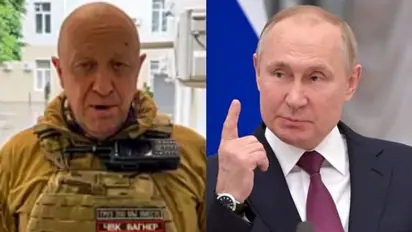'Last chapter in Putin's book of failure': US says mutiny in Russia reveals cracks in his rule (WATCH)

Synopsis
US has said the Wagner Group's short-lived rebellion shows the "cracks" in Vladimir Putin's power. US Secretary of State Antony Blinken told US media that the mutiny was a "direct challenge to Putin's authority".
The brief and disorderly uprising in Russia, which was organised by the rebel Wagner group, revealed "cracks" in the leadership of Russian President Vladimir Putin, according to US Secretary of State Antony Blinken on Sunday. “This is just an added chapter to a very, very bad book that Putin has written for Russia. But what’s so striking about it is, it’s internal,” Blinken told CNN, describing the situation as “extraordinary.”
“The fact that you have from within someone directly questioning Putin’s authority, directly questioning the premises that – upon which he launched this aggression against Ukraine. That, in and of itself, is something very, very powerful. It adds cracks. Where those go, when they get there, too soon to say, but it clearly raises new questions that Putin has to deal with,” Blinken added.
In an interview with CBS, Blinked added, "We'll see if this means that Wagner forces are coming out of Ukraine. The very fact that over the weekend, Wagner forces were coming out of Ukraine and going into Russia and toward Moscow, in and of itself is, is extraordinary.... this is just the latest chapter in a book of failure that Putin has written for himself and for Russia."
The remarks from United States' top diplomat highlights the crisis' transient ferocity, which began when Yevegeny Prigozhin, the leader of the Wagner Group, led his fighters towards Moscow while seizing control of Russian military installations.
On Friday, Prigozhin publicly charged the Russian military with storming a Wagner camp and murdering a "huge amount" of his soldiers. He has been railing at Russia's senior general, Valery Gerasimov, and defence minister Sergei Shoigu for months, accusing them of failing to lead Moscow's invasion of Ukraine.
The Kremlin replied to the Wagner Group's display of power by putting highly armed troops on the streets of Moscow and issuing an advisory to the populace to stay inside.
By Saturday afternoon, the Kremlin said that an agreement had been struck to put a stop to the uprising, with Wagner fighters turning back from their march and Prigozhin travelling to the neighbouring country of Belarus.
Even though it was only temporary, the stunning challenge to Russian leadership had the potential to bring about a catastrophe and undermine the nation's already faltering efforts to wage war in Ukraine.
Even if tensions have subsided, former CIA Director David Petraeus believes that after the failed coup, Putin may be more vulnerable than he has been in the previous 23 years.
“The government has been shaken. Putin has been shaken personally. This makes him more vulnerable, arguably, than he has at any time in his two-decade rule of the Russian Federation,” Petraeus told CNN.
The invasion of Ukraine, which Petraeus, a retired US Army general, described as a "catastrophic mistake, a terrible blunder on the part of Putin," will now be clouded even more by the insurrection, he claimed.
Blinken stated on Sunday that it is "too soon" to predict how the drama will finish and that the people of Russia should decide the future of their government.
“But we can say this: First of all, what we’ve seen is extraordinary. And I think you’ve seen cracks emerge that weren’t there before,” he added.
Also read: How Putin's reputation was punctured by Wagner mutiny
Check the Breaking News Today and Latest News from across India and around the world. Stay updated with the latest World News and global developments from politics to economy and current affairs. Get in-depth coverage of China News, Europe News, Pakistan News, and South Asia News, along with top headlines from the UK and US. Follow expert analysis, international trends, and breaking updates from around the globe. Download the Asianet News Official App from the Android Play Store and iPhone App Store for accurate and timely news updates anytime, anywhere.